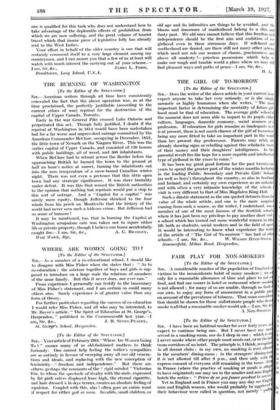THE BURNING OF WASHINGTON
[To the Editor of the SPECTATOR.]
Sin,—American writers through all time have consistently concealed the fact that the above operation was, as at the time proclaimed, the perfectly justifiable (according to the current ethics of war) reprisal for the destruction of the capital of Upper Canada, Toronto.
Early in the war General Pike crossed Lake Ontario and perpetrated this act. Though fully justified, I doubt if the reprisal at Washington in 1814 would have been undertaken but for a far worse and unprovoked outrage committed by 'the American Commander McClure, occupying in December, 1818, the little town of Newark on the Niagara River. This was the earlier capital of Upper Canada, and consisted of 150 houses with public buildings, all of wood, and 500 inhabitants.
When McClure had to retreat across the Border before the approaching British he burned the town to the ground at half an hour's notice at sunset, turning the inhabitants out into the zero temperature of a snow-bound Canadian winter night. There was not even a pretence that .this little open town had any strategic significance. It was sheer brutality under defeat. It was this that roused the British authorities to the opinion that nothing but reprisals would put a stop to this sort of outrage. And a "Capitol for a capital " was surely mere equity, though Jefferson shrieked to the four winds from his perch on Monticello that the history of the world had never seen such a hideous crime. But Jefferson had no sense of humour !
It may be mentioned, too, that in burning the Capitol at Washington scrupulous care was taken not to injure either life or private property, though I believe one house accidentally






























































 Previous page
Previous page